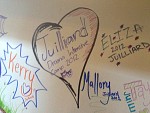Title
Subhead
Every summer for the past five years, a varying group of Juilliard students—mostly actors but including some music and dance representatives—has traveled to Snow College in Ephraim, Utah, to lead a weeklong drama intensive. During these sessions on acting, dance, movement, singing, theater games, text/poetry, and “creativity” sessions, local middle and high school students create—with light-handed guidance—work that they present to families and friends on the workshop’s final day. (Juilliard Jazz also conducts jazz camps at Snow every summer.)
Body
This past June, I accompanied the team as mentor and, if necessary, troubleshooter along with Teresa McKinney, Juilliard’s director of educational outreach.
I found the Juilliard students to be fine teachers—skilled, supportive, flexible, kind, enthusiastic. They quickly established rapport with the workshop participants, who ranged in age from 11 to 19. That span, although seemingly awkward, proved beneficial all around. Within the workshop environment, perceived—accurately—as safe, the pre-teens and teens opened up. As the Juilliard team listened calmly, the workshop students told, in poetry or dance or song, the stories of their lives and dreams.
Many of the stories revealed that bullying was endemic to the students’ schools, communities, and childhood culture. They, their friends, their siblings, people they loved, had been hurt for every conceivable reason: differences of belief, ethnicity, race, sexuality, personality, physicality. A sad common denominator was the children’s report that adults, specifically teachers and school administrators, failed to send a message that bullying would not be tolerated.
The bullying they described was physical and emotional—the latter a mean-spirited hounding of the soul. These students had had enough of it. They wanted a world in which they could expect, and offer, generosity. They demonstrated, on the spot, their determination to form that world.
Those who were more comfortable singing than dancing got up and danced anyway. Those who were shy spoke up. Each step of the way, they applauded one another’s gifts and, when talent was less in evidence, they applauded the mettle of effort. They expressed themselves bravely and, if their courage flickered, their fellow students, regardless of age gap, comforted them, buoyed them up, understood them.
This manifestation of compassion struck me as the most promising aspect of what was transpiring, and I began to weigh the possibility that creative workshops of this sort could serve as a template. Replicate the tone and humane atmosphere; export the prototype; have an impact on other communities.
At the end of the week, the Juilliard team had returned home. But if the Utah students could return to their lives with a sense of being able to care (in all positive senses of the word) for their peers, if they would step forward, even when adults around them abdicated responsibility for building an empathic society, then one, a few, perhaps many children could model behavior that was inclusive and gentler.
I’m hoping that adult educators will, as the Juilliard students did in their teaching, exemplify a better ethos. I’m counting on it. And if adults do that, then I’m counting on the moral courage of our children.





